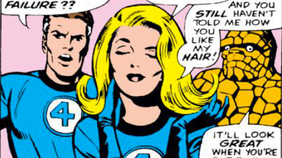The Clock's Guiding Hands: Time and Morality for Doctor Manhattan
- hannahlien
- Apr 25, 2015
- 2 min read

Chapters 4 and 9 of Watchmen interest me particularly, because it is here that Alan Moore provides readers with insight into Doctor Manhattan’s character. While Rorschach is so extreme in his beliefs that he seems almost alien, he is still within the realm of comprehension. Doctor Manhattan however, is entirely removed from the sphere of human morality. He comprehends and views everything on an entirely different field from the rest of humanity.

In chapter 4, Moore and Gibbons show readers the past, present, and future in Doctor Manhattan’s life. As the character moves through different events (his childhood, his death and rebirth, his time with Janey, and with Laurie) the narration boxes indicate that he experiences time simultaneously. This is later confirmed in chapter 9 when he tells Laurie “Time is simultaneous, an intricately structured jewel that humans insist on viewing one edge at a time, when the whole design is visible in every facet,” (6.6). This may seem a simple enough explanation of the character, however, it must be noted that this is vastly different from what any normal human can experience or even comprehend.
In order to even begin to understand Doctor Manhattan (and his “Blue and Orange Morality,” a term I borrow from TV Tropes), Moore has to break down each segment of Manhattan’s life and to provide explanation. Even out of order, readers must take each event one at a time. “If you’d only relax enough to see the whole continuum, life’s pattern or lack of one, then you’d understand my perspective,” Manhattan tells Laurie, (9.23.3). But it’s not so easy as the character would like it to be. In trying to see things as Manhattan does, Laurie realizes that the Comedian is her father and suffers a break down, illustrating the difficulty and alienness of Manhattan’s perception of life and time. It’s easy enough to accept that a character markedly different from us is experiencing time in a markedly different way, but it is another to attempt to understand what that is actually like.

Doctor Manhattan in his distance from the rest of humanity reveals that he doesn’t value life until Laurie is able to persuade him into seeing it as a thermodynamic miracle. Though he knew in advance what would happen, he still made Laurie debate with him and to provide an argument for saving Earth. This is similar to when it’s mentioned earlier that Manhattan knew about what would happen to J.F.K., but did nothing. In chapter 9, he tells Laurie that he is a “puppet who can see the strings,” (5.4). Because he experiences time all at once, Manhattan sees no point in trying to change anything at all. As he sees it all at once, there is no way that it can be altered. Furthermore, even if life on Earth were eradicated, for Doctor Manhattan, it would still continue to exist, further removing the urgency that others like Laurie feel. This seems bizarre to others who wonder why he doesn’t try to do something, to try to change the bad. However, for Manhattan, time is a perfectly carved jewel. Why try to alter it?




















Comments